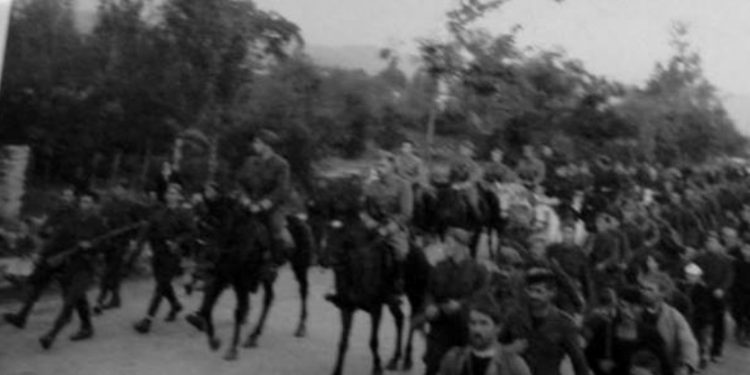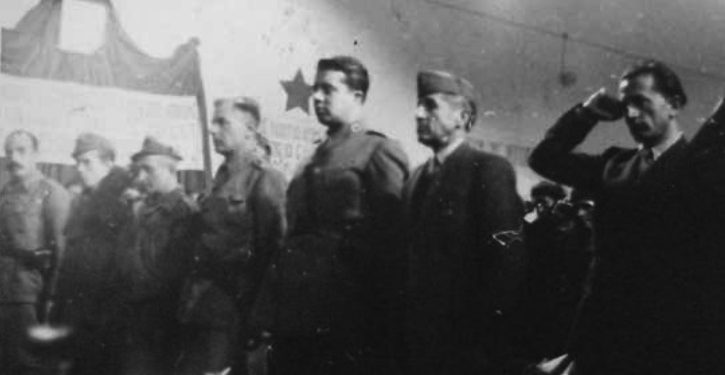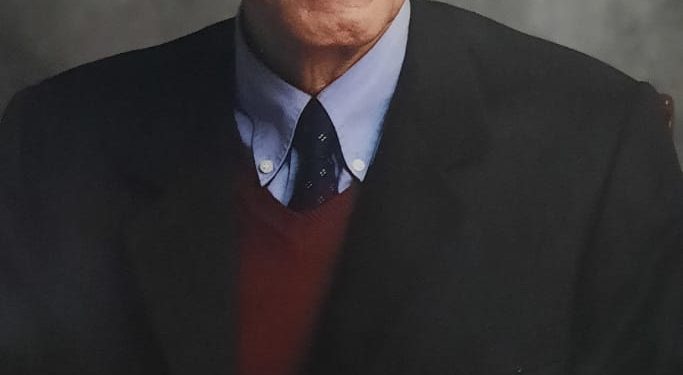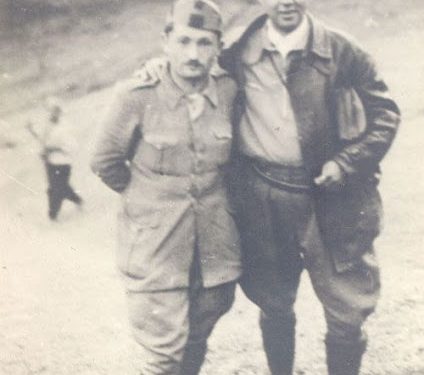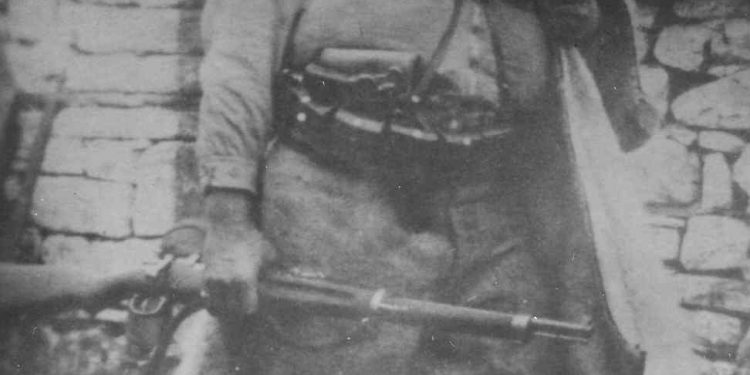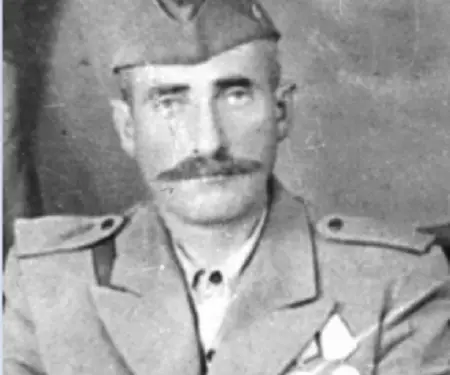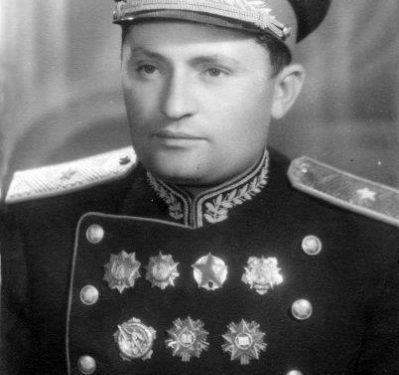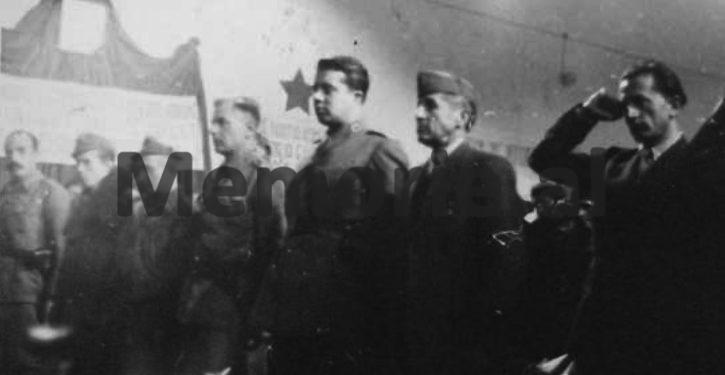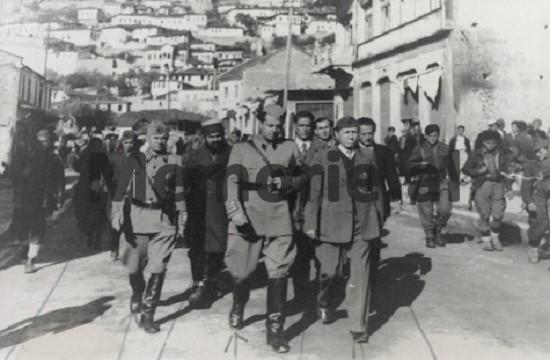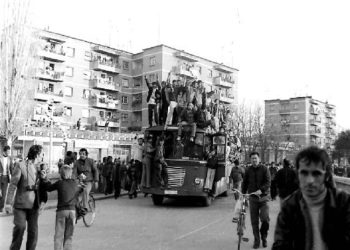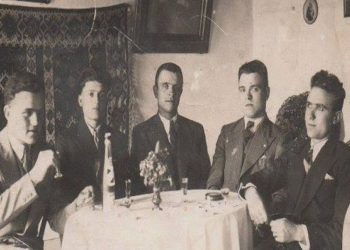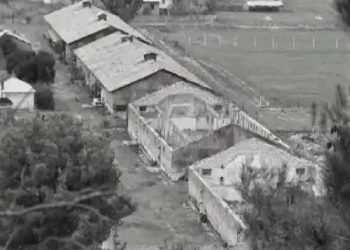By Elmas Guga
Second part
Continued from the previous issue
Memorie.al/ It should be well understood that Enver Hoxha did not come to the helm of the SNP to promote Marxism-Leninism and to be proclaimed to us, as the regime claimed, as a shining beacon in Europe and in the world, for the society of paradise that was building on us. He did not even rise to the top of the SNP to proclaim him as a legendary LANÇ leader as his followers today want to “powder” him. To better understand the above we must ask: Was Enver the interpreter of the dreams, hopes, sacrifices and war of all those Albanian communists who were represented with their best people at the founding meeting of the SNP and who elected (de jure) Enver Hoxha at its head? The truth about what happened gives a negative answer: Enver Hoxha, together with his dreams, hopes and war, buried one by one all the communists of that generation who aspired for a free, independent and democratic Albania. He did this during the war and after the liberation, killing and imprisoning them for decades, from where a small number of them were able to survive, only after the fall of the regime.
Our scholars can give us an even more exhaustive answer, not simply and only out of curiosity, if they give us the list for the fate of the “Two Hundred Petrites-Communist Flowers” whose song the regime boasted so much about! We are convinced that over 80% of them suffered this elimination. The others served the regime and not all of them went to the other world not by the command of God. In our judgment, as stated earlier, the elimination of the communists, and not only them, was done in the framework of the war strategy to suppress the national spirit of the Albanians. Thus, Enver Hoxha was placed at the head of the SNP to use its status as a “battle horse” to achieve its goals and Tito as his boss, to suppress the national spirit to the level of individuals, that after the liberation of provided for a dictatorial regime, as it happened. Because only in this way Albania could be celebrated under Yugoslavia! And when he failed to do so, he added even more external and internal enemies, making his regime even more bloodthirsty.
Let us return to our argument that the Albanian communists, and not only those of the generation that founded the SNP, were diametrically opposed to what Enver Hoxha thought as their leader. In the book “When the Party Was Born” Enver criticizes all communist groups for, as he says, group spirit and vision. I judge that he does this in the role of a great ideologue to show not only why he was above others but also to justify (silently) the massacre he committed with all those who elected him. He ignores and strongly targets especially the Communist Youth Group. Apparently, as it happened, this group has been his priority to eliminate. Sadik Premte and Anastas Lula were leaders of a group that included Kosovar boys with ideas of a new world for a free and independent Albania and Kosovo. Thus, they could only be seen as enemies in the eyes of Tito’s emissaries at that meeting. Meanwhile, Friday and Lulo would be Enver’s political rivals. Therefore, as Sadik Premtja recalls, since the days of its establishment, Enver advised both of them to go to the base for the work of the party and to be educated!!!
Sadiku understood Enver’s evil and suggested to Lula not to go because they would eliminate him, as it happened. While Sadik Premtja after many vicissitudes in the district of Vlora escaped the murder and fled to Italy. The Italian communists could not understand what Sadiku was telling them about the climate of terror that had been sown among the communists in Albania. “I did not expect the Italians to understand me,” says Sadiku, “and I went to France.” There he was and remained with communist convictions until the end of his life in 1991. So, the communists in the west were only peaceful but by no means cruel! They could not understand the malignant communism of the East which was only valid for dictators. To us, communism, even as a term, is synonymous with evil because of half a century of persecution, why not even now because of its mentality. But we must know and understand well that the Albanian communists who founded the SNP and not only them, had Western ideas of communism as an alternative to development. For this, it suffices to refer to the plenum of the Central Committee of the SNP that met in Berat on November 23-27, 1944.
There, Enver Hoxha was severely criticized and for this he was dismissed from all party functions with an almost unanimous vote. At that plenum, Sejfulla Malëshova, one of the senior leaders of the SNP, told the audience that Enver had many other mistakes that they did not know about. “However,” he told the delegates, “we must discuss the dismissal in Tirana.” Dali Ndreu also supported his opinion and so it was. The main topic of criticism in the plenum was the personal policy pursued by Enver Hoxha regarding the Antifascist Front. He had kept away from the Front the middle and wealthy families, prominent opposition groups and intellectuals from the right. I think that this sentence of the Berat plenum shows a lot in support of our argument. That the SNP in Berat did not see Albania as a “parcel” of its own the day after the liberation of the country.
-That the homeland belonged to all Albanians who had to leave the country, as it was settled in Peza.
-The middle and rich strata, the opposition groups had to be part of the Front, to be in power with their representatives after the liberation.
I think that these messages make the plenum of Berat, the brightest event in the history of the SNP, during its life 1941-1948. It was this brilliance that Enver called the “black spot” in the history of the SNP. In 1945, when the nationalists of the Antifascist Front were encouraged to run for parliament under the banner of the Democratic Front, Sejfulla Malëshova continued to believe in political pluralism and a bright future for Albania. At that time Mestan Ujanik, who was a guest at his house in Tirana, Malëshova had told that Albania would become more prosperous than Switzerland because it had even more wealth. And just like Switzerland, Albania as a small country had to maintain political ties with the West.
But it was not said that the philosophy of Sejfulla Malëshova and the idealistic communists should win, that Albania and the Albanians should win. The homeland was destined to become a sacrifice for Tito and Enver, who continued on the path of political revenge. Sejfulla Malëshova was beaten in the February 1946 plenum as a man with Western views. It continued with the elimination of 16 opposition MPs, including the nationalist Mestan Ujaniku in 1947-1948. Secured the elimination of Nako Spiru and Tuk Jakova (1955). Tuku, while in prison, hastened his elimination by poisoning him. And the year 1956 comes with the Party Conference for the city of Tirana. It was the culminating political event after the liberation that opposed the regime of Enver Hoxha. The spirit of this conference was savagely suppressed by the regime where Enver’s followers (who would later become the next victim for the dictator) did not fail to shine. Dozens of communists and their families were imprisoned and interned. In later years, imprisonments and eliminations of communists and nationalists on behalf of the regime continued.
But let us return to the plenum of Berat, which, in my opinion, confirmed the fact that Enver Hoxha had nothing spiritual to do with the SNP and the Albanian communists. Under the umbrella of the SNP he had worked and done things so well that they probably even exceeded his master’s expectations. With Tito’s help, he had preceded not only the Berat plenum but also the Anglo-American allies, with the power he had gained in Përmet and Berat. In Përmet, Albania was deprived of the mortgage of being a state before the fascist occupation. It was treated as “free land” to pass as “land of xanun” for those who would like it after liberation. Communist historiography has strongly sugared the Përmet congress and the provisional government of Berat for the triumph of the ideals of LANÇ and the power of the people. In fact, the opposite has happened: THEIR BURIAL! What can be said about Enver’s tears and prayers not to dismiss him in the plenum of Berat?!
Of course, the tears were not an expression of his remorse but merely a ploy to escape dismissal. Even more than that, inwardly the tears, in my opinion, expressed excitement and gnashing of teeth for all those who criticized him. I say this because he had gained a lot of power and could handle everything, even dismissal. However, being in charge of the SNP would make it easier for him to carry out his black plans, as he did in the period 1945-1948. In that period, he devilishly hid the SNP behind the Antifascist Front (E.G. Democratic Front after August 1945), making it almost non-existent among the people. He did this political trick to stay away from the mutual responsibilities of the SNP and himself in the face of the monstrous crimes committed against the people on behalf of the Front. In 1948, when Stalin’s letter-bomb exploded, Enver hastened that along with the unprecedented terror in the people, he also blamed the hiding of the SNP on Koçi Xoxa’s group. According to Enver Hoxha, Koçi and Tito had deceived the SNP and Enver who had put them in the “mouse hole”! Truly a great deception, but it succeeded peacefully and ruled for another 40 years.
The truth is that Enver, since he was appointed head of the SNP, did not have the mission of strengthening the party politically and organizationally. An argument for this, in addition to the plenum of Berat, was the next plenum of K.Q. of the Party of April 1945. Kadri Hoxha, who from the autumn of 1944 continued to lead our military mission at the Allied headquarters in Italy, harshly criticized Enver Hoxha in that plenum. He criticized the policy pursued by Enver Hoxha towards the Anglo-American allies, from which we risked the non-recognition of our government by their governments (as it happened). Kadri Hoxha criticized the party’s policy of hiding behind the Front and the lack of evidence of Communist Party membership. His criticisms fell on deaf ears because Enver’s mission was and remained the political and organizational trampling of the SNP until the first congress which in my judgment was also the last congress of this party. And here’s why:
At the first SNP congress, Enver Hoxha turned from the great sinner into the great savior with the supportive majority. The party was called the ALP. It was said that by then the communists had fought and henceforth had to work. Anyway, the essence was not has been so simple! It was there that the party statute was adopted where he sanctioned for the first time his own model of being a communist. According to this model the communists had to swear from morning to evening for the party and Enver. That they would be willing to work and sacrifice wherever the homeland, the party (meaning Enver) and the people called you! That the communists of this model would not think according to their own head but according to Enver’s head! It was different to work with the SNP communists. They were united by the ideal of a free, independent and democratic Albania. February: The communists of the SNP were united by the ideal for the “Head” of Albania, unlike the latter (of the ALP) who were united by the ideal for the head of Enver! This is the essence of the difference between them. We believe that Enver at the head of the SNP has been in a conflict of interest with them. He also had the ideal “head” of Albania but not for the Albanians but for the “pocket” of Tito and himself. In this sense his relations with the SNP have been hostile. Priority eliminations in the party, lack of statute and membership records until the introduction into the “mouse hole” have been some of the main measures that provided agony to the SNP.
Thus, Enver Hoxha implemented the pro-Yugoslav policies at the head of the movement on behalf of the SNP. He mortgaged the assets of LANÇ and the government in the name of the outgoing patient (SNP) and when he put it in the coffin he passed it all in his own name in 1948. This was Enver Hoxha’s great battle with the SNP, the people and his place to sit in the ruler’s throne.
LANÇ relations with Enver Hoxha and the ballistas
In these thirty years LANÇ has become a battlefield between the right and the left in Albania. Ballists claim that it was a civil war between Albanians. While its left defenders through numerous arguments refute the accusations and remind the ballistas of jealousy for LANÇ as a possible party and collaborators of the invaders.
Basically, the debate on LANÇ has been motivated by the political interests of the day, with high intensity, especially in the 90’s, when more and more time passes, it fades and is not bringing any product. Today the debate about war resembles a war game between neighborhood teens that war alone is not. Thus, the debate on LANÇ alone LANÇ is not helping!
LANÇ as a historical reality has all the potentials to help itself to prove itself as a liberation war. Which means that she is not afraid of the accusations of the ballistas, just as she is not excited by her defense lawyers.
Here are some of the arguments:
- LANÇ made Albania part of the great world anti-fascist coalition in the Second World War.
- Over 5% of Albanians became part of the liberation war that finalized the formation of 25 partisan brigades.
- Over 400 commanders and commissars of squads, battalions, groups, brigades, divisions and corps led this war.
- From July 1943 to October 1944 the Albanian anti-fascist army was led by a general staff and by the war headquarters in the regions.
- Albania is one of the few countries in the world anti-fascist coalition that liberated its country with its own forces, and even helped to liberate the peoples of the former Yugoslavia.
- The LANÇ army fought over a thousand fierce battles in the fight against the invaders everywhere in Albania and the former Yugoslavia. That thousands of martyrs have fallen, of whom 750 in the territories of the former Yugoslavia.
- Today, the work of LANÇ is witnessed by martyrs’ cemeteries, war museums, headstones wherever it was fought.
However, these testimonies and values of LANÇ as major works of the Albanian people, day by day are being endangered and damaged for as long as, for three and a half centuries we continue to keep quite hidden from the truths of LANÇ. In our estimation the anti-fascist war has two sides to the coin:
– The bright side that shines like sunlight or the golden color that embodies the glory of the Albanian people in World War II, the ideals of freedom that inspired that heroic war, the sacrifices of an entire people with its partisan sons and daughters. This medal also has a black side like tar that embodies the political intrigue that was used as a knife in the back at the expense of LANÇ and the Albanian people. It was this great infidelity produced by the communist regime that desecrated the war and the ideals of freedom. In our judgment, this political intrigue has been and remains the greatest anti-Albanian wound inflicted by Serbian chauvinism on Albania and the Albanian people in the entire history of the Albanian state to date.
This great evil managed by Tito at the hands of the Albanians caused us our fifty years of slavery. Now that the shackles have been broken the attempts to hide the evil for the shame of our hands are anti-historical in relation to the truth and as anti-national as the act of this intrigue itself. I consider the battle of the left and the right for LANÇ more than for the defense of the war as a distraction from the truth that happened with the war and the Albanians. One cannot understand otherwise the great zeal of the leftists to deal with the ballistas from morning to evening, remembering that they were collaborators of the occupier. This has been and continues to be unbridled bullying against the ballistas, branding them as the black sheep and the great evil of this country, not only for the war. The suckers of Balli today know very well that even if they write ten times the books and one hundred times the articles they have written so far against LANÇ, they cannot undo its values as a liberation war. Just as they cannot undo the evil of their fathers as collaborators of fascism. Then why do the great lawyers of LANÇ “burn their souls”?
That is why they continue to shout: “Ballists, ballists”, as they do not want to “read” the Titoists who wreaked havoc with the woe they caused to LANÇ and the Albanians! In my estimation the forehead suckers today are more honest when it comes to the war debate. They know full well that their fathers yesterday, first were victims of Titoist politics and then victims of themselves as they sided with the invaders. Thus, the ballistas and not only them but the whole society needs to open the Pandora’s box for the truths of LANÇ. Such a reassessment of the truths of the war will increase many times the glory of this war so far tainted by the communist regime and at the same time can end the absurd division among Albanians that has ruled us for three and a half centuries.
Balli scholars today are proving to us the falsity of the data of the communist regime regarding the total number of martyrs of LANÇ as well as the total number of partisan forces in that war. It is different with the left who hide behind the finger when it comes to the truths of war and the communist regime. It has happened that in the debates about the war, the left has told the right that after the Second World War, thousands of collaborators in Italy, France, Belgium and elsewhere have received severe sentences of hanging, shooting and long-term imprisonment. Hinting that their fathers in Albania also deserved the punishment. So far so good! But why do not they say that their children, grandchildren and great-grandchildren in those countries were free citizens, who were never persecuted for the work of their ancestors as happened in Albania!
Our historians seem to find it easy to answer “What happened to us after the liberation was another matter”! Congratulations! Or do you think that we became dictators because of the Anglo-American mistakes in Albania! In my estimation we are not dealing with “another issue” but with the continuation of the same issue that happened to us during and after the war (until 1948). At a time when ours and Tito were “spitting” into each other’s mouths. That “other issue” served by our professors that happened after the liberation (actually after 1948) is nothing but the second act of the Albanian tragedy that was preceded by the first act in the period 1941-1948. The political intrigue of the LANÇ era, which in its essence consisted of the corpus of Titoist policies in Albania, hit all the structures of our society with the priority of hitting the marrow of the national consciousness. Thanks to this policy the first act of tragedy was designed. During this period, the strike and elimination of communists, anti-fascist nationalists and those of Balli was promoted, the strike of the middle and rich classes. In short, national disunity was promoted. And everything that happened after the liberation (after 1948) was basically not “another matter” but a continuation of the Titoist (dictatorial) mission launched during the war. Thus, the persecution of Balli’s descendants after the war was a continuation of the beating of their fathers during the war. This can explain the tragic fate after the liberation of most of the over 400 commanders and commissars who led the war.
What can our historians tell us about the tragic fate of these captains, as well as the tragic fate of members of the Army General Staff and local leaders of war structures? How will they justify and cover the contributions of these hundreds of LANÇ leaders with that stunt of the “other issue”?!
The history of the contributions of these commanders and commissars and the leadership of the general staff should form the core of the history of LANÇ. That the great heroes of this heroic war are hundreds among whom we can mention names such as: Spiro Moisiu, Dali Ndreu, Tahir Kadare, Tuk Jakova, Gjin Marku, Mestan Ujaniku and Mustafa Gjinishi, Sejfulla MAlëshova, Bedri Spahiu, Nako Spiru, Nexhip Vinçani, Rrahman Uruçi, Iljaz Sevrani and Mane Nishova, Rrahman Parllaku, Petrit Dume and Hito Çako, Muhamet Prodani, Vaskë Gjini and Todi Naçi, Sadik Bekteshi, Teme Sejko, Panajot Plaku. All these and dozens of others like them have been not only great contributors to LANÇ, but also unparalleled patriots in their patriotism.
I appreciate all of them as great heroes of the war because they did everything for the freedom of Albania and never bargained with the Titoists to forgive Albania to others who were against the dictatorial policy of Enver Hoxha. Precisely because they were such they were eliminated by the communist regime.
How many Albanians were these great heroes is enough to bring to the reader’s attention a piece of evidence from the debate of Enver Hoxha with Tuk Jakova in the plenum of K.Q. of 1955. Enver responds to Tuk’s harsh criticism with strong tones. He says no to Tuku – first we are internationalists, then we are communists and finally we are Albanians! Tuku answers no – the opposite is true: First we are Albanians, then communists and finally (exaggerating ca-E. G) internationalists!
So were all those great heroes of LANÇ. For all of them Albania was the first while for Enver…. the last! Recently we hear it said that Tito helped in the formation of the SNP but they “calm down” when they say that the internal factor was crucial anyway! We understand the concern of such a lecture. Basically, this is pure manipulation even very bitter especially when articulated by history professors!
No gentlemen historians whoever you share such opinions! Tito did not help the formation of the SNP to help the Albanians but to enslave them. Tito did not help but got on the shoulders of the SNP and the Antifascist Front. Tito undermined the national platform of the Peza Conference to undermine LANÇ and the ideals of freedom of the Albanian people. Tito promoted the dictatorial regime from the days of the establishment of the SNP because only in this way could he ensure the annexation of Albania to Yugoslavia.
In short: Tito has been a decisive factor in determining our half-century-old national disaster. This is the truth that must be said and written. Unfortunately for us, our historians seem very biased as they claim to write the history of Albanians in the framework of a project of the Academy of Sciences. It is easy to understand their excitement as they publish for the first time a compromising document of the Balli leaders as collaborators of fascism or the reactionary circles of the neighbors.
They do well but I remind historians that Balli’s card has already run out of ink. The ballistas with what they did have not been the great evil of our country. Mostly they hurt themselves. The great evil for Albania and the Albanians has been Tito and the titism that stabbed LANÇ and the ideals of freedom of the Albanian people. If the dictator used the Balli card as blood food to rule, our one-sided historians will likely use it to manipulate our glorious history!
Despite our skepticism, we wish that the taxpayers’ money does not go for the promotion of the work of mercenaries but for that of Albanians! Let’s wait and see! /Memorie.al




